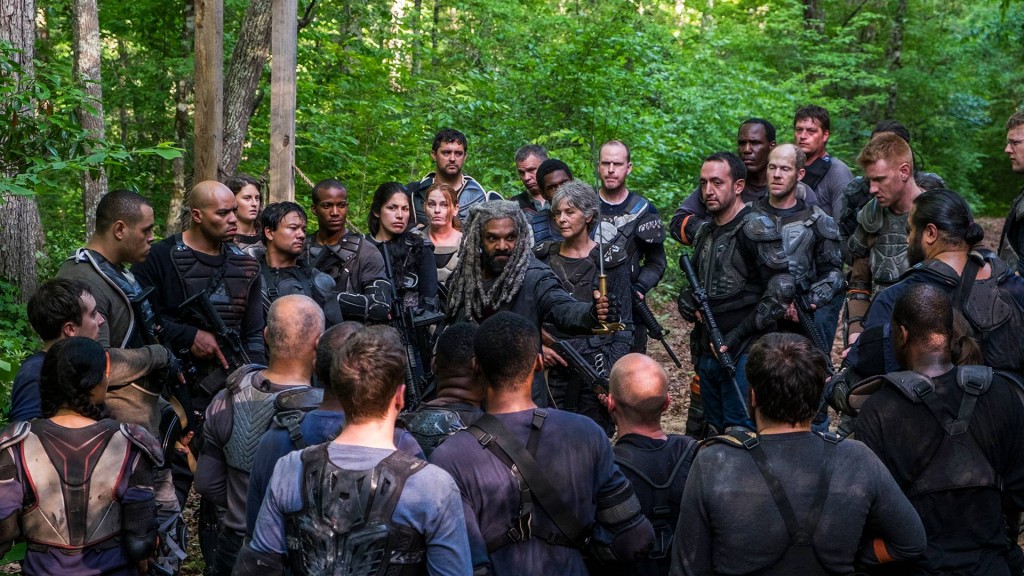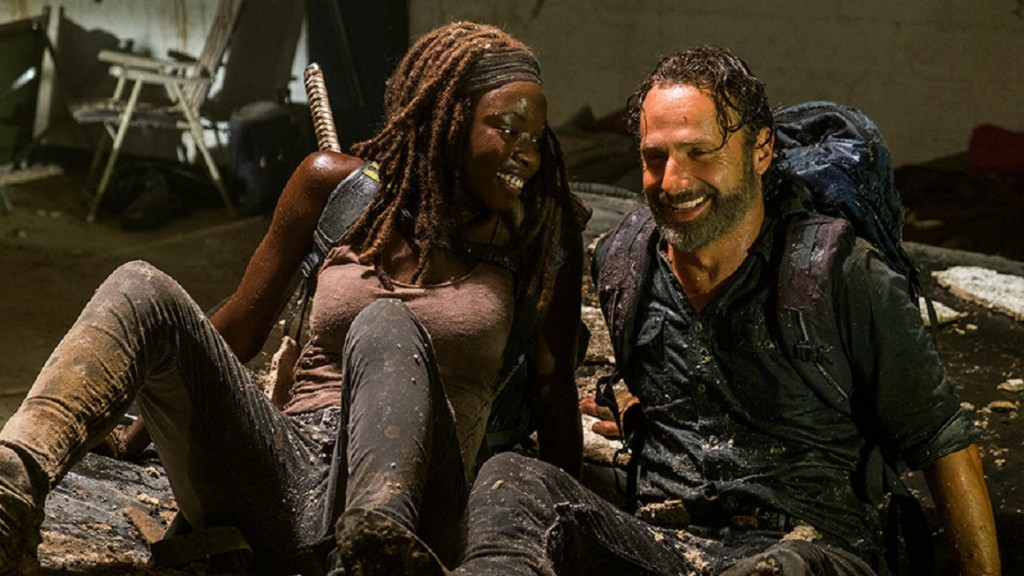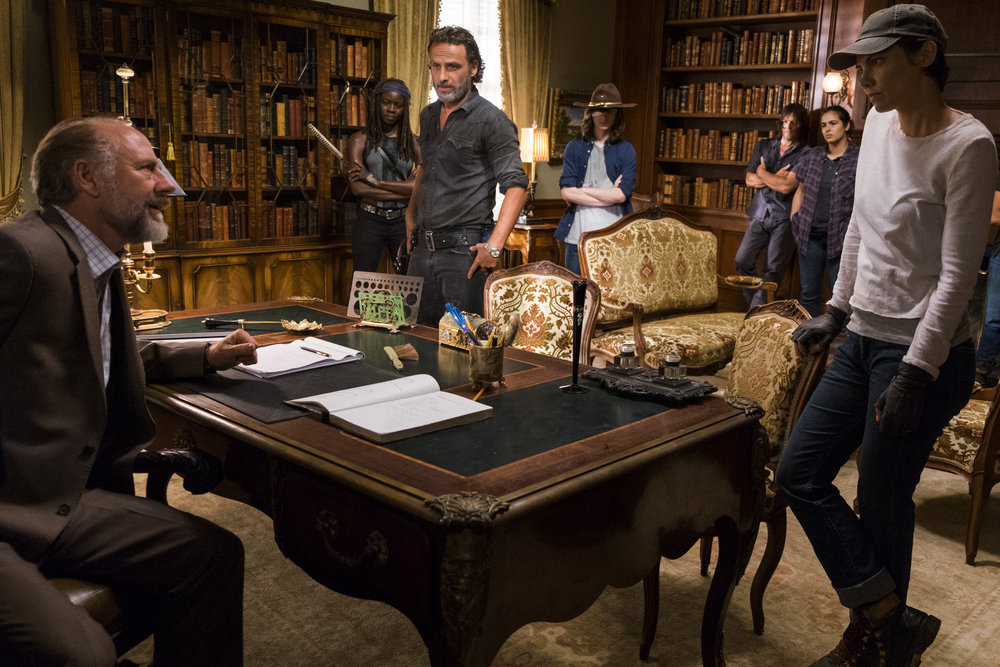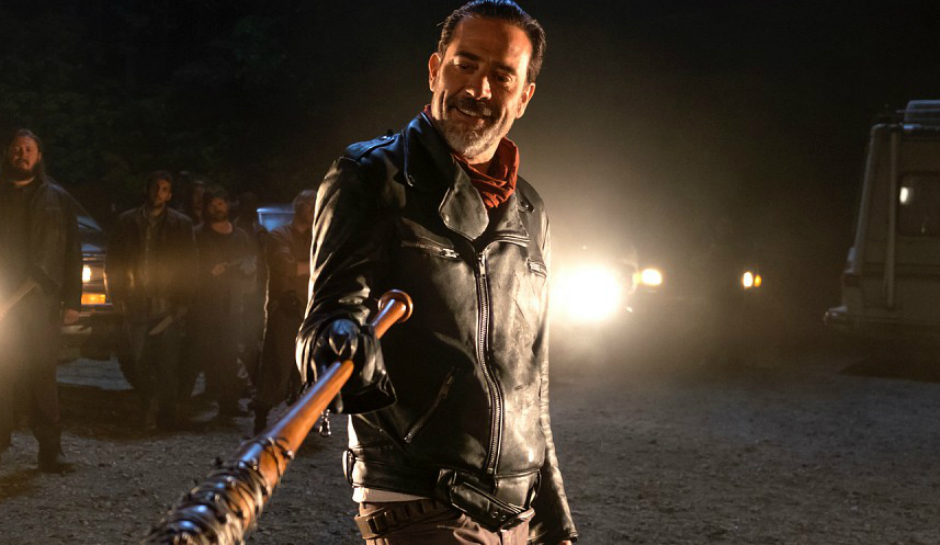-
Recent Posts
- Better Call Saul: There Are No Happy Endings between a “Rock and Hard Place”
- Black Widow Keeps It in the Family for Natasha’s Last Ride
- Loki Finds New Purpose in the Man behind the Mischief
- In its Debut, Star Wars: The Bad Batch Decides Whether to Obey or Rebel
- Nomadland: A Film Out of Time, For Our Times
Archives
Recent Comments
- Ed Clarke on Contact
- Matt on Why “The Frying Game” Is a Dark Horse Contender for The Simpsons’s Worst Episode Ever
- Lilly Dow on Contact
- Stacey on Veep’s Series Finale and the Hollowness of Getting What You Want
- Evan Jaocbs on Contact
Meta
Tag Archives: Rick Grimes
The Walking Dead Ponders the Same Old Moral Quandaries in “The Lost and the Plunderers”
I’m not the first person to suggest that The Walking Dead has exhausted itself creatively. Eight years in, almost any show is going to have trouble feeling vibrant and fresh. But what’s conspicuous about “The Lost and the Plunderers” is how clearly it evinces the sense of a late era version of this show — a show that’s always tried to aim a bit higher than its grindhouse roots — that’s running out of meaningful things to say.
The Walking Dead Has Good Ideas and Bad Dialogue in “Time for After”
The continued struggle of The Walking Dead is remarkably consistent. The show’s unhurried pace often gives it time to delve deeply into the theme of the week and really chew on it rather than just gulping it down and moving on like the eponymous, ravenous zombies who populate the series. Sure, some episodes are little more than epic climaxes or piece-moving adventures, but for the most part, even the worst episodes of the show have something they’re trying to say and some idea they’re trying to dig into.
But the show is almost impressively bad at crafting the sort of dialogue for its characters that can ground those examinations in something that feels like real human experience and interactions.
The Walking Dead Shows Negan as a True Believer and a Leviathan in “The Big Scary U”
“A war of all against all.” That’s how philosopher Thomas Hobbes pithily explained the “state of nature,” his theoretical account of what it was like when human beings lived without government, without order, and without rule. He imagined a life that was “nasty, brutish, and short” and posited that we all needed a Leviathan, the personification of the force and power of the government, to avoid that unenviable existence. On Hobbes’ account, people needed to give up certain freedoms and turn things over to the Leviathan to ensure compliance with the order of the day, as the price to avoid that endless, indiscriminate war.
In Negan’s mind, he is that Leviathan. The last time The Walking Dead interrogated Negan’s moral philosophy, it left it ambiguous how the leader of The Saviors viewed himself. It was nebulous whether Negan really believed that his brutal ways were for the greater good, or whether he was just spinning propaganda to justify the comparatively lavish and carefree lifestyle he could enjoy while others toiled.
“The Big Scary U” is much less ambiguous. There is a certain sense that Negan may be deluding himself, offering rationalizations and eliding the darker or more self-serving side of the choices he’s made. But it nevertheless becomes clear that, on the surface at least, he is a true believer, someone who thinks that he’s doing what needs to be done to avoid a worse fate for everyone.
The Walking Dead Is One Big Jumble of Plots in “Monsters”

For a while, it felt like The Walking Dead had found a nice, consistent rhythm in its storytelling. Since about Season 4, each season would include a handful of episodes that featured everyone in the cast, but most would be smaller, more standalone affairs that focused on a narrower subset of characters. These episodes would tell individual stories and focus on small facets of bigger events that deepen our understanding of the personalities and problems at play. It gave the show a certain decompressed feeling that raised accusations of “boring,” but which also provided The Walking Dead with the space to flesh out its characters and make those stretches between the big set pieces feel less like wheel-spinning and more like an effort, however variable in its success, to make those grand finales matter.
But Season 8 has seemingly abandoned that tack. While not everyone has showed up in every episode thus far, each installment this season has felt like an immediate sequel to the prior one. The siege that began in the premiere continued in last week’s episode. And this week’s episode, “Monsters,” follows directly from there, depicting the same moral conflicts and the same lingering issues that Rick, Daryl, Carol, Ezekiel, Morgan, Jesus, Tara, and Aaron faced in the prior episode. We’re getting one giant story here, rather than a collection of related, but distinct plots that become part of a larger mosaic.
The Walking Dead Keeps Asking the Same Tired Questions in “The Damned”

You are never going to fully get away from the “Is it right to kill?” question when you’re telling a zombie apocalypse story. One of the core aspects of the genre is forcing people to make life and death decisions in extreme situations. That’s part of what makes zombie movies and shows both thrilling and thought-provoking; they put the audience in the shoes of the characters and let us wonder whether we’d be saints or slayers when the rules of civilization no longer apply and mortal peril lurks around every corner.
But my god, The Walking Dead has been exploring these issues for seven-going-on-eight seasons at this point, and while it hasn’t dug into every possible permutation of them, it’s come close. There’s some benefit to putting new characters into those scenarios and having them vacillate between mercy and lethal pragmatism while trying to figure out the right way to live in this harsh environment. But you can only lean into this sort of “That’s not who we are” back-and-forth for so long on a television show before it starts to become rote.
The Walking Dead Imagines What the Future Looks Like in “Mercy”

Someday, The Walking Dead will end. Sure, with this premise, the folks in charge could theoretically cycle through cast members like Saturday Night Live and go on into eternity. But the practical reality is that, as the show begins its eighth season, it’s likely closer to its end than its beginning.
But it’s hard to imagine what that ending will look like. Comic book creator Robert Kirkman famously declared that his story could go on forever and that he had no clear ending in mind. The recent Robot Chicken special poking fun at the show envisioned a relatively normal future where society has been rebuilt and there’s a Walker Museum devoted to the struggle of the series (with a nice “historical game of telephone” vibe). Others have speculated about who might survive to the end, whether anyone will find a cure, and how a new civilization comes to fruition. Still, there’s no obvious place for this story to end, no clear way to reach a series-length measure of catharsis.
The Walking Dead Finds the Joy at the Edge of the Abyss in “Say Yes”

For a while now, the running line on The Walking Dead has been that the show is too bleak and too steeped in misery. The open-ended nature of the series, and thus the requirement for ever more adventures, means our heroes can never truly win. The abject state of the world has to continue. So for the plot to have any bite, people we care about have to keep dying; equilibrium can’t ever be established, and more problems and obstacles and losses have to pile up.
It’s understandable how the prospect of that continuing struggle wears on critics and viewers alike. Maybe I’m just jaded from years of post-apocalyptic fiction and other gritty works that allow me to take this sort of thing in stride. But I get it; the notion that this is simply the unending march of The Walking Dead, never to cease, with characters we like continually being picked off, could easily be too much for people.
But what I like about the show, what keeps me coming back (and, incidentally, what’s always underemphasized when this debate picks up again and again) is that The Walking Dead is also a show about what motivates people to go on in these circumstances. It’s about the emotions and connections that give the survivors something to fight for when there’s no institutions or societal expectations to force them to do it. It presents a world of outrageous freedom, one where people still choose to sacrifice and to love, where there is still joy and comfort regardless of whether the environment is hospitable to it.
Posted in Television, The Walking Dead
Tagged Michonne, Rick Grimes, The Walking Dead S07E12, The Walking Dead Season 7
Leave a comment
The Walking Dead: Two Good Bits Stand Out in the Doldrums of “Rock in the Road”

The Walking Dead is a frustrating show for a multitude of reasons, not the least of which is that even in an episode like this — one filled to the brim with dull speechifying, blatant wheel-spinning, and lame parables — there’s one or two moments of brilliance that make it hard to just give up on this ever-mercurial series. Even when the show is stalling for time, serving up weak dialogue, or leaning into its weakest tendencies, it sprinkles in a couple of great bits that manage to rise above the rest of the flotsam.
This week, it’s the zombie cheese slicer and Rick’s smile, two dissimilar but connected moments that demonstrate what The Walking Dead is capable of when it’s not tripping over its own bad lines and plot contrivances. Such faults are out in full force in “Rock in the Road,” an episode that sees Rick and the gang at The Hilltop and The Kingdom in an effort to rally forces sufficient to take on The Saviors. The forging of that coalition is inevitable, and the arguments over whether to unite and fight or cling to the status quo have already been turned over by dozens of people dozens of times, which leaves “Rock” with only the thrilling walker-slaying sequence and a brief but clever way to convey Rick’s state of mind to recommend it.
Posted in Television, The Walking Dead
Tagged Episode Reviews, Rick Grimes, The Walking Dead Season 7, Zombies
Leave a comment
The Walking Dead Repeats Itself to Death in “Service”
I enjoyed the season premiere of The Walking Dead better than most. I understand the complaints that it was too bleak, too cruel, and too hopeless, but to my mind, it made sense to embrace those elements in order to establish Negan, both a character and as a threat. There have been so many ineffectual villains on this show, so many antagonists who seemed like mere speed bumps along the way toward Rick and company’s inevitable victory. TWD needed to make a big introduction to convince the audience that Negan and The Saviors were something different, something dangerous and more serious.
I also didn’t mind the hopelessness of that opening episode. Sure, it’s difficult to watch our heroes being broken, to see characters we know and love brutalized while the bad guys take great joy in the effort. But shows like The Walking Dead need stakes. In order for the good guys’ eventual triumph to feel earned and meaningful, the series has to make its main antagonist not only someone whose defeat doesn’t seem preordained, but also someone who’s actually worth beating. The suffering at this point of the arc will, with any luck, pay off down the line when the protagonists strike their blow against Negan and his goons.
The only problem is that the premiere already felt like a lot. It gave us a lot of blood and guts, a lot of horrible acts, and a lot of Negan preening and chewing scenery. That worked as an opening salvo for the character and as the culmination of the build his debut, which had been bubbling up since the midpoint of Season 6. But it was a great deal to take in all at once. The viewer can only stand so much of that level of cruelty and velvet-trimmed venom before it starts to overwhelm.
The Walking Dead Gets Biblical in its Season 7 Premiere, “The Day Will Come When You Won’t Be”

Most people know the bible story of when God tested Abraham. It’s one of those biblical references that just filters through the popular consciousness, even if you haven’t cracked open Genesis anytime lately. The Good Lord tells Abraham, his devoted servant, to prove his devotion by offering his son, Isaac, as a sacrifice. Abraham follows this command, building an altar, binding his son to it, and raising his knife in the air, ready to perform the grisly deed. But God stops Abraham at the last minute, explaining to him that this was all simply a test of his devotion and then providing a ram to be sacrificed instead.
I can remember hearing this story in Sunday school and how the rabbi would milk this moment a bit. Keeping second graders enthralled with bible stories isn’t necessarily easy work, but he knew how to draw out the details of the story, embellish a little at the margins, and hold the tension of moments like that one. Even if you’d heard the rabbi tell this story half-a-dozen times before, he made you believe that maybe this time it would be too late, that Abraham would act and all would be lost. He knew, in short, how to build the suspense.




